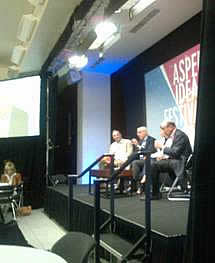| 2010 |
|
| An opportunity to still take part in this incredible event. Entering its seventh year, the Aspen Ideas Festival will gather some of the most interesting thinkers and leaders from around the US and abroad to discuss their work, the issues that inspire them, and their ideas. Presented by the Aspen Institute and The Atlantic, the Festival is unique in its dedication to dialogue and exchange, and in its commitment to bringing ideas to the public at large. FORA.tv is pleased to present Festival programs taking place at the Aspen Institute's Paepcke Auditorium. For more information, visit: www.aifestival.org |
|
Relative to our actual political leaders, he showed astonishing clarity about the structural issues facing this country and yet his ideas about them did not seem partisan. It was seductive to think -- and Gates would probably have the gumption to take the job -- that if you made Bill Gates king of the world, he'd make it a better place.
Gates thinks differently about problems than most of the people -- Supreme Court justices, attorney generals, financiers, journalists -- he has shared the Aspen stage with. He is a computer nerd, not a lawyer or writer: he has different problem frames and proposes different solutions. And Gates is just the leading edge: more and more people trained in the dark art of computer programming are entering the eminence grise stage of their lives. At events like Aspen Ideas Festival, nerds will dominate more and more of the speaking slots. You might call it a renaissance of technocracy, which had first peak in America in the years following World War I. With the path to public office often running through the liberal arts and law school, many America leaders are in the biologist camp. What's it going to mean for national conversation if there are a lot more engineers talking and a lot les biologists? What about areas that are irreducibly complex? Where are his worldview's blindspot's? (Gates's stance on de-carbonizing energy, for example, has drawn scorn. He publicly made a call to find "energy miracles", which drew scorn from other energy experts.
One place we could look for some answers is China: nearly all the leaders of the country were trained as engineers including Hu Jintao. "If your goal is the U.S. relative to everyone else and you don't care about people dying of Alzheimer's or anything, then 1946 is your year. Everything has been downhill since then," Gates said. In 1946 war-torn Europe was struggling to recover and China was suffering through an incredible famine. The United States dominated everything. But a country with just 5 percent of the world's population cannot continue to dominate in innovation like it has, Gates said. If the Chinese discover a pill to cure Alzheimer's, he said, "I'll take it. We should use that technology even if it was done on an international basis." Gates clearly wants the U.S. to change its course in areas like education to maintain its position as world leader, but he is also certain China's role will continue to grow."They represent 20 percent of the global population and they are on their way to using 20 percent of the world's energy and having 20 percent of the ideas and having 20 percent of the military budget. I mean, it's outrageous they should do this," he said tongue in check."Their innovation is full speed ahead," Gates concluded, "and so much the better as long as we're also renewing things that kept us so far ahead." |
 |
Shortly after 10 Russian spies took plea deals in a federal New York courtroom Thursday in an agreement to swap four detained spies currently in custody in Moscow, Attorney General Eric Holder explained the reasoning behind the trade at the Aspen Ideas Festival.
Holder said federal authorities had been tracking the spies for years and that the espionage than Russians were engaged in posed an unspecified threat to America. 'The potential for what they were going to do is very serious", he said. Holder said the U.S. Department of Justice decided not to jail them in the U.S. in order to free the four spies working 'on behalf of Western countries".
|
| In the public interview, Holder said the feds arrested the spies late last month because one of them was leaving the U.S. for France."The concern was if we let him go we would not be able to get him back," Holder explained. "If we did not act at that point the possibility existed that we would not be able to break up the ring with the totality that we have now." The spy trade developments were one of a handful of pressing legal issues that the country's top law enforcement officer tackled in the 30-minute interview, which was aired on "Face the Nation".
In addition, he said the U.S. Constitution, not politics, drove him to file a lwasuit against Arizona for its controversial new immigration law. He said the feds need to govern immigration and state or local laws inconsistent with the constitution -- and federal policy -- need to be struck down to keep enforcement consistent along the U.S. borders. We need to deal with this problem comprehensively," he said. Holder was coy about whether BP is the primary focus of his department's recently announced criminal investigation into the massive Gulf oil spill from a BP rig."I did not say BP was under investigation," he explained. "I said we had opened a criminal investigation and did not say who the subject was." Likewise, he declined to indicate whether the justice department is leaning toward prosecuting alleged 9/11 mastermind Khalid Sheik Mohammed in civilian court or in a military tribunal. He pressed unsuccessfully last year for trying the accused terrorist in olower Manhattan. He said, "No decision has been made as to exactly where he will be tried." But he said he wants to get the case into a courtroom soon: "Justice has been delayed too long." Asking Holder whether he and President Obama expect to close the Guantanamo Bay detention center, as they promised to by the start of 2010, Holder called on the U.S. Congress to fund the purchase of a new facility and said: "This is still a priority for this administration." He lamented the politicization of closing the controversial jail and said, like the Mohammed trial, "it's another situation where politics have unfortunately played a role." |
Retired Justice Sandra Day O'Connor introduced Ruth Bader Ginsburg and noted the historic nature of te penind confirmation of Elena Kagan in the line of women serving on the high court, which O'Connor herself began in 1981."It took 191 years to get the first woman on the Supreme Court," O'Connor said. "I served 12 years before we got the second and it was Ruth Bader Ginsburg ... I know that she is looking forward to now getting another woman on the court to serve with her."
Rosen called Ginsburg "the Thurgood Marshall of women's rights," and she proudly referred to herself as "a flaming feminist."
On Kagan, Justice Ginsburg said, "I am so glad that Elena is joining us." When Kagan was running the law school at Harvard, Ginsburg said, she asked her to pick one of her students every year to clerk on the Supreme Court. And Ginsburg recalled that during her own senate confirmation hearings in 1993, then-Sen. Joe Biden, chairman of the judiciary committee, hired Kagan to vet Ginsburg's past."He wanted to appear very well-prepared for the hearings," Ginsburg remembered. "So he hired Elena, who was then working at the White House. He had her read every opinion I ever wrote, every speech I ever gave ... She got to know me quite well." |  |
|
| Greenspan breaks down 'greatest global crisis ever'
In a lunchtime conversation, former Federal Reserve Chairman identified major contributing factors. I've always been in favor of the principle of sub-prime loans because I've always thought that minority homeownership in a capitalist society was highly desirable.Greenspan did outline his belief that higher or additional taxes are an effective way to cut the national deficit but only in the short run. "The general conclusion that more people are coming to is that you cannot significantly contract fiscal problems through taxes. It will cure the deficit temporarily, but the problem is that the forces that generate it are still in play, and you'll continue to get the increase again. But if you cut spending permanently, it's a different base.
|
 |
Other three financial experts gave different views on whether the financial crisis is really over. The United States has moved from recession to recovery. Now it's going to require patience to move from recovery to expansion. Fortunately, Obama realizes the problems posed by federal debt and plans to address it once the economy is stronger. The world is coming into balance thanks to the biggest global shift most people will witness in their lifetimes. |